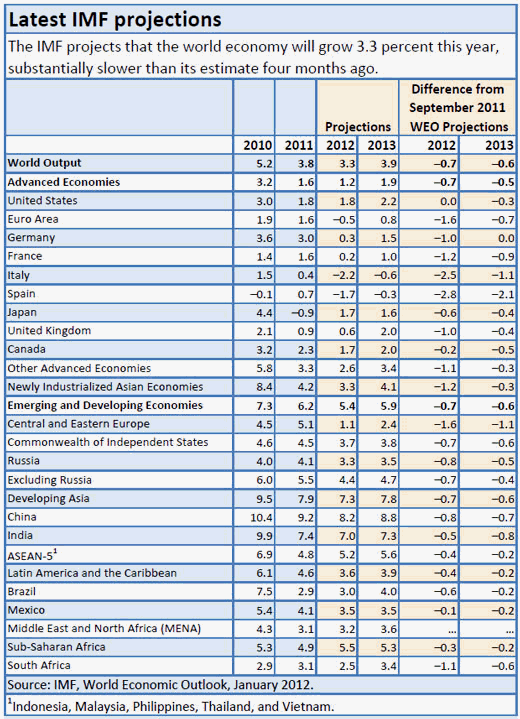
Typical street scene in Santa Ana, El Salvador. (Photo: iStock)
IMF Survey: IMF Marks Down Global Growth Forecast, Sees Risk on Rise
January 24, 2012
- IMF says global recovery expected to stall, risks to intensify
- Euro area expected to fall into mild recession, rest of world to slow
- Comprehensive package needed to restore financial stability
- Countries should avoid too rapid tightening of fiscal policy
With intensifying strains in the euro area weighing on the global outlook, the International Monetary Fund (IMF) has sharply cut its forecast for world growth this year, saying prospects have dimmed and risks to financial stability have increased.

Factory worker in Calvisano, Italy: IMF says restoring confidence in euro area is key to ending region’s crisis (photo: Paolo Bona/Reuters)
WORLD ECONOMIC OUTLOOK
In an update to its World Economic Outlook (WEO), the IMF said that the euro area would fall into a mild recession in 2012 after the euro area crisis entered a “perilous new phase” toward the end of last year, affecting other parts of the world including the United States, emerging markets, and developing countries.
Overall, activity in the advanced economies is now projected to expand by just 1.2 percent in 2012—a downward revision of ¾ percentage points relative to the forecast last September—picking up to a still tepid 1.9 percent the next year. The global growth outlook for this year is 3.3 percent.
“Given the depth of the 2009 recession, these growth rates are too sluggish to make a major dent in very high unemployment,” the IMF said.
With the revised forecast, the IMF also released updates on January 24 to its Global Financial Stability Report (GFSR), which tracks issues in banking and capital markets, and its Fiscal Monitor, which tracks government debt and budgets.
Europe is epicenter
“The outlook for growth is mediocre, and it could be worse,” said Olivier Blanchard, the IMF’s Economic Counsellor.
At a press conference in Washington D.C., Blanchard said that “the world recovery, which was weak in the first place, is in danger of stalling. The epicenter of the danger is Europe, but the rest of the world is increasingly affected.”
He told reporters there was an even greater danger if the European crisis intensified. “In this case, the world could be plunged into another recession,” he said.
But Blanchard said that with the right set of measures, “the worst can definitely be avoided, and the recovery can be put back on track. These measures can be taken, need to be taken, and need to be taken urgently.”
In a speech in Berlin on January 23, IMF Managing Director Christine Lagarde laid out the main elements of a policy path forward. Europe, which is at the center of global concerns, needs stronger growth, larger firewalls, and deeper integration, she said, but added that other economies also have an important role to play to restore balanced global growth. As for the multilateral component, Lagarde said that the IMF was ready to help and was seeking to increase its lending resources by up to $500 billion.
Asia still strong
The report said in 2012–13, growth in emerging and developing economies is expected to average 5¾ percent—a significant slowdown from the 6¾ percent growth registered in 2010–11, and about ½ percentage point lower than projected in the September 2011 WEO. This reflects the deterioration in the external environment, as well as the slowdown in domestic demand in key emerging economies.
Despite a substantial downward revision of ¾ percentage point, developing Asia is still projected to grow most rapidly at 7½ percent on average in 2012–13.
Economic activity in the Middle East and North Africa is expected to accelerate in 2012-13, driven mainly by the recovery in Libya and the continued strong performance of other oil exporters. Most oil-importing countries in the region face muted growth prospects due to longer than expected political transition and an adverse external environment.
The impact of the global slowdown on sub-Saharan Africa has to date been limited to a few countries, most notably South Africa, and the region’s output is expected to expand by about 5½ percent in 2012.
The adverse spillover effects are expected to be the largest for central and eastern Europe, given the region’s strong trade and financial linkages with the euro area economies.
The impact on other regions is expected to be relatively mild, as macroeconomic policy easing is expected to largely offset the effects of slowing demand from advanced economies and rising global risk aversion. For many emerging and developing economies, the strength of the forecasts also reflects relatively high commodity prices.
Europe key to restoring confidence
Blanchard said that growth in the euro area in 2012 was now forecast at -0.5%, a decrease of 1.6% relative to the IMF’s September 2011 projection. “In particular, we predict negative growth of 2.2% in Italy, 1.7% in Spain,” he said.
The IMF said the most immediate policy challenge is to restore confidence and put an end to the crisis in the euro area by supporting growth, while sustaining fiscal adjustment, containing deleveraging, and providing more liquidity and monetary accommodation.
In other major advanced economies, the key policy requirements are to address medium-term fiscal imbalances and to repair and reform financial systems, while sustaining the recovery. In emerging and developing economies, near-term policy should focus on responding to moderating domestic growth and to slowing external demand from advanced economies.
Financial sector risks rise
In its GFSR update, the IMF said global financial stability has moved deeply into the danger zone as sovereign bond spreads in the euro area have widened, and the European Central Bank has been forced to play an increasingly vital role in sustaining the euro area financial system. Despite the efforts of European policymakers to contain the euro area debt crisis and related banking problems, a comprehensive and decisive policy response is still needed, the IMF said.
“European policymakers need to promptly put in place a comprehensive package that restores confidence, and need to implement the policy measures agreed at the October and December euro zone summits,” said José Viñals, the IMF’s Financial Counsellor and head of the Monetary and Capital Markets Department.
The IMF said officials should create a large firewall designed to protect sovereigns that are solvent but facing financing strains. Although institutions intended for this purpose exist, they currently do not have the size and flexibility required to be fully credible.
Banks need to increase their capital to restore financial markets’ confidence in their ability to weather the downturn. Wherever possible, this should be done by raising capital from private sources, but public funding should be available for this purpose when needed. There should also be a pan-euro-area facility with the capacity to take direct stakes in banks.
Officials need to monitor the adjustment of bank balance sheets in the face of the crisis, and act to prevent “bad” deleveraging—asset sales that have the effect of reducing the supply of credit to the economy. Officials should aim to limit deleveraging of their banks not only in home markets but also abroad.
The IMF added that despite the resilience demonstrated in recent years by emerging markets, they face risks from deleveraging by euro area banks, particularly in emerging Europe countries.
Progress on fiscal side
Fiscal deficits in many advanced economies fell significantly during 2011, and most plan substantial adjustment this year. Continued adjustment is necessary for medium-term debt sustainability, and should ideally occur at a pace that supports adequate growth in output and employment, according to the latest Fiscal Monitor.
“The pace of fiscal consolidation in advanced economies in 2012 is already high,” said Carlo Cottarelli, head of the IMF’s Fiscal Affairs Department, which produced the report. “Too rapid consolidation, if economic growth slows, could exacerbate risks.”
Most countries should allow automatic stabilizers, such as unemployment insurance payments that rise as jobs are eliminated, to work if growth slows. When economic conditions deteriorate they can cushion the impact on demand.
Countries that have the fiscal space, including some in Europe, could consider slowing the pace of consolidation this year. Some countries, notably the United States and Japan, need to clarify their plans to reduce debts and deficits in the years ahead.
Some emerging economies with low debt and deficits and declining inflationary pressure have room to make policy more supportive of economic activity. Others have little space for more than the operation of automatic stabilizers if growth slows.
Emerging economies highly dependent on commodity revenues and external capital inflows also need to consider the risk of a large and protracted decline in these flows.



